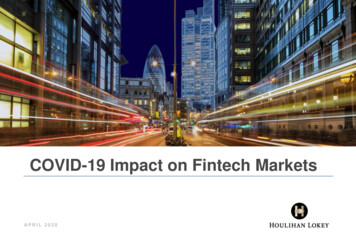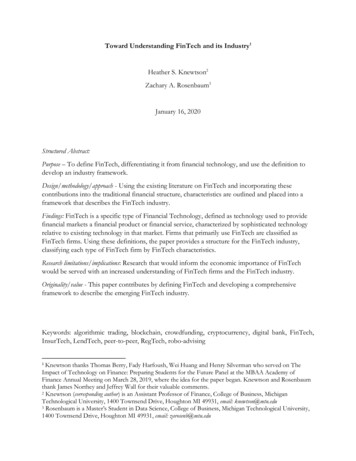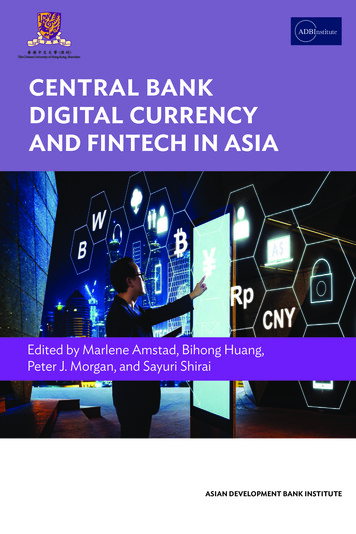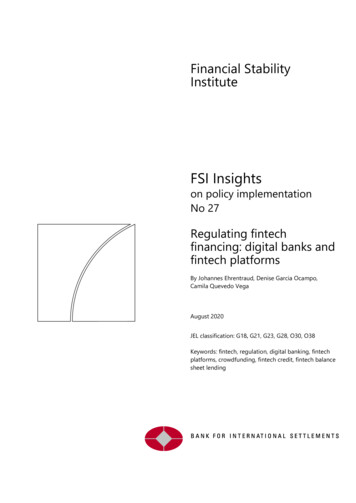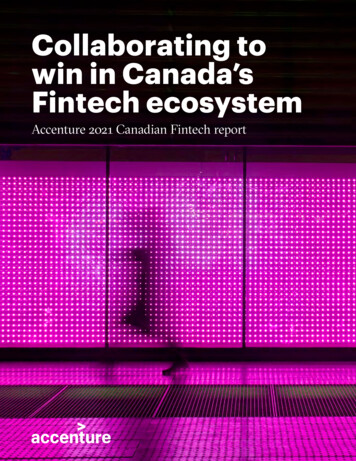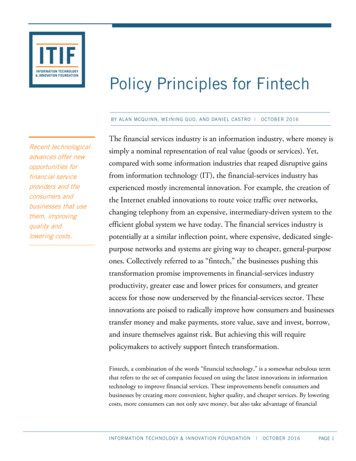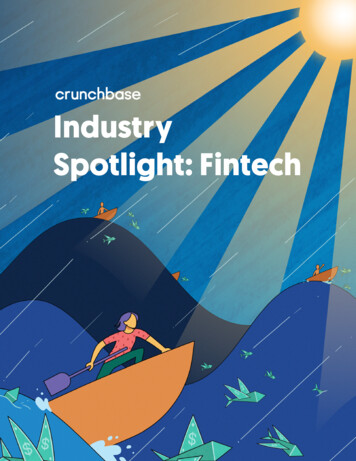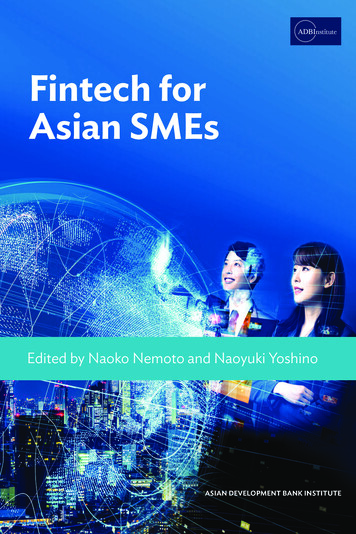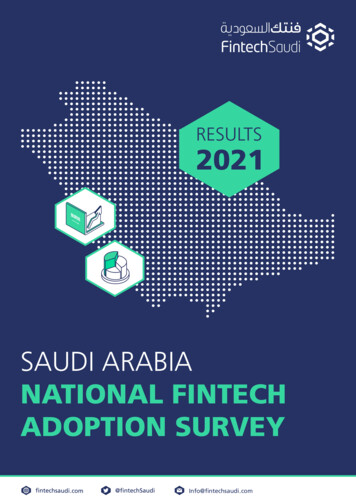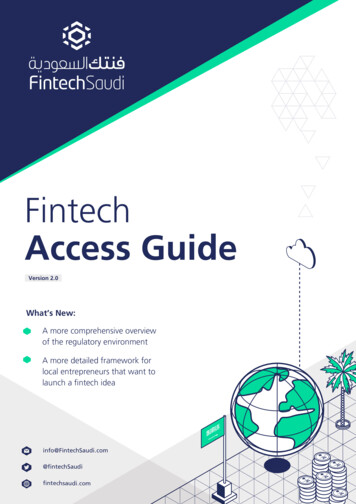
Transcription
FintechAccess GuideVersion 2.0What’s New:A more comprehensive overviewof the regulatory environmentA more detailed framework forlocal entrepreneurs that want tolaunch a fintech di.com
A Letter fromFintech Saudi teamDear Reader,Welcome to Fintech Access Guide Version 2.0!The Fintech Access Guide has been developed by Fintech Saudi to support fintechentrepreneurs at every stage of their development. Since the launch of FintechSaudi, we are pleased to have seen the fintech industry in Saudi Arabia advanceforward. The Fintech Access Guide has been updated to reflect the developmentof the fintech industry so that it continues to support fintech entrepreneurs inmoving forward.Fintech Saudi continues to play a role in supporting local and internationalfintechs in areas such as navigating the regulations, developing their fintechsolution or entering the Saudi market. Our aim is to support the agenda ofregulators, government’s entities, and entrepreneurs with respect to theKingdom’s Vision 2030. We see ourselves as an advocate for fintech companiesto support their agenda with regulators and government entities and we hopethat this is reflected in the Fintech Access Guide.The Fintech Access Guide includes:Part 1: Regulation Clarity for Conducting Fintech Activities in Saudi ArabiaPart 2: Framework for Local Entrepreneurs to Launch a Fintech IdeaPart 3: Options for International Fintechs Interested in Entering the Saudi MarketIn addition to everything from Version 1.1, Version 2.0 provides a moredetailed overview of the regulatory environment and a more detailedframework for local entrepreneurs that want to launch a fintech idea.The goal of the Fintech Access Guide is to support fintech companies'enquiries to initiate their fintech in Saudi. As the market continues todevelop, the Fintech Access Guide will be developed to support the industry.We hope the Fintech Access Guide is useful and we would love to hear yourfeedback on how it can be improved.Sincerely,The Fintech Saudi Team2 2020 Fintech Saudi - All Rights Reserved
Part 1: Regulation Clarity for Conducting Fintech Activities in Saudi ArabiaPART 1Regulation Clarity for ConductingFintech Activities in Saudi ArabiaPART 2Framework for Local Entrepreneursto Launch a Fintech IdeaPART 3Options for International Fintechs Interestedin Entering the Saudi MarketDisclaimer and Final Remarks3 2020 Fintech Saudi - All Rights Reserved
Part 1: Regulation Clarity for Conducting Fintech Activities in Saudi ArabiaPART 1RegulationClarity forConductingFintechActivities inSaudi Arabia4 2020 Fintech Saudi - All Rights Reserved
Part 1: Regulation Clarity for Conducting Fintech Activities in Saudi ArabiaIntroductionFintech Saudi has prepared the Fintech AccessGuide for fintech companies wishing to enterthe Saudi market.This section provides clarification on thecurrent status of the regulatory environmentin the Kingdom. It was prepared inconsultation with Saudi Arabian MonetaryAuthority (SAMA) and Capital MarketAuthority (CMA), the official legislativeauthorities for the financial sector in SaudiArabia. It includes an overview of theexisting regulations and provides guidanceon the current options for fintech companieswishing to operate in the Kingdom. It alsoprovides an overview of the relevantgovernment entities that fintech companiesshould be aware of based on publiclyavailable information.This guide was issued with consent of SAMAand the CMA, and should not be consideredas a change to the official regulations issued.In the event of any inconsistency betweenthis guide and the official regulations, theofficial regulations must be considered.5 2020 Fintech Saudi - All Rights Reserved
Part 1: Regulation Clarity for Conducting Fintech Activities in Saudi ArabiaWho are the RelevantFinancial Regulators?The financial sector in Saudi Arabia is governed by two regulators, The SaudiArabian Monetary Authority and the Capital Market authority, each with a setof financial services under their jurisdiction.Saudi ArabianMonetary Authority(SAMA)SAMA, the centralbank of the Kingdomof Saudi Arabia, wasestablished in 1372H(1952). It is entrustedwith performing manyfunctions pursuantto several laws andregulations.SAMA regulates all companies that areinvolved in providing: Banking services: includes the businessof receiving money, opening currentaccounts, issuing debts, foreign exchangetransactions, etc. Finance Companies: including real estatefinance and lease finance Insurance Companies: and re-insuranceactivities Credit Bureaus Payments Providers: including PaymentSystems, Payment Service Providers, MoneyExchange Houses and Cash CentersEven if the entity is not regulated/ licensed by SAMA, the nature ofthe financial activities may still be regulated by SAMA. Examplesof fintech activities that fall under SAMA’s jurisdiction include thefollowing (non-comprehensive list): Intelligent cash management Peer to peer lending Virtual currency6 2020 Fintech Saudi - All Rights Reserved
Part 1: Regulation Clarity for Conducting Fintech Activities in Saudi ArabiaCapital MarketsAuthority (CMA)The current CapitalMarket Law ispromulgated by andpursuant to RoyalDecree, which formallybrought the CapitalMarket Authority(CMA) into existence.The CMA’s functionsare to regulate anddevelop the SaudiArabian Capital Marketby issuing requiredrules and regulationsfor implementingthe provisions ofCapital Market Law.The basic objectivesare to create anappropriate investmentenvironment, boostconfidence, reinforcetransparency anddisclosure standards inall listed companies,and protect theinvestors and dealersfrom illegal acts inthe market.7The CMA mainly regulates the following capitalmarket activities (as per Article 2 of CMA’sSecurities Business Regulation): Dealing: a person deals in a security asprincipal or as agent, and dealing includesto sell, buy, manage the subscription orunderwrite securities; Arranging: a person introduces parties inrelation to securities business, advises oncorporate finance business or otherwise acts tobring about a deal in a security; Managing: a person manages a securitybelonging to another person in circumstancesinvolving the exercise of discretion; Advising: a person advises a person on themerits of that person dealing in a security orexercising any right to deal conferred by asecurity; and Custody: a person safeguards assets belongingto another person which include a security,or arranges for another person to do so,and custody includes taking the necessaryadministrative measures.Even if the entity is not regulated/ licensed byCMA, the nature of the financial activities maystill be regulated by CMA. Examples of fintechactivities that fall under CMA’s jurisdiction includethe following (non-comprehensive list): Robo-advisory Equity-based crowdfunding Social trading and investing platform Arranging for offering of securities andinvestment in debt instruments. Distributed Ledger Technology (DLT) to arrangeand offer securities and customer services 2020 Fintech Saudi - All Rights Reserved
Part 1: Regulation Clarity for Conducting Fintech Activities in Saudi ArabiaWho are the Other Regulators/ Authorities that FintechsShould be Aware of?Ministry of Commerce (MCI)MCI governs the commercialsector in the Kingdom, bysetting policy, issuing commercialregulation, supervising themarket, and issuing licenses.MCI also regulates e-commerceactivities in the Kingdom.MCI WebsiteMinistry of Investment ofSaudi Arabia (MISA)Ministry of Investment ofSaudi Arabia (formally SAGIA)is responsible for providinginvestment licenses tointernational investors, andhas a one-stop shop whichsupports international investorsin completing requiredgovernmental procedures toestablish a company in KSA.MISA WebsiteMinistry of Communications andInformation Technology (MCIT)MCIT is responsible for thecommunication and informationtechnology sector in theKingdom. Their objective is tomaximize the effectiveness andperformance of the public andprivate sectors by enablingdigital transformation.MCIT Website8Small and Medium EnterprisesGeneral Authority (Monshaat)Monshaat regulates theentrepreneurial ecosystem andsupports, develops and catersfor it as per the best practices.Monshaat Website 2020 Fintech Saudi - All Rights Reserved
Part 1: Regulation Clarity for Conducting Fintech Activities in Saudi ArabiaCommunications and InformationTechnology Commission (CITC)National CybersecurityAuthority (NCA)The Communications andInformation Technology Commission(CITC) is the information andcommunications technology sector(ICT) regulator in KSA. CITC isresponsible for regulating cloudcomputing in the Kingdom.The National CybersecurityAuthority is a government entityin charge of cybersecurity inthe Kingdom. NCA has bothregulatory and operationalfunctions related to cybersecurity.NCA WebsiteCITC WebsiteSaudi Data and Arti icialIntelligence Authority (SDAIA)SDAIA has been mandated tolead the Kingdom’s data andartificial intelligence (AI)agenda. SDAIA is defining thenational data and AI strategyfor the Kingdom.SDAIA WebsiteFinancial Services DevelopmentProgram (FSDP)The Financial Sector DevelopmentVision Realization Program underthe direction of the Ministry ofFinance and as part of Vision 2030aims to develop a diversified andeffective financial sector to supportthe development of the nationaleconomy, diversify its sources ofincome, and stimulate savings,finance and investment. FSDP alsoincludes targets for developmentin particular areas such ascashless activity, savings, financialinclusion etc.FSDP Website9 2020 Fintech Saudi - All Rights Reserved
Part 1: Regulation Clarity for Conducting Fintech Activities in Saudi ArabiaAre you Providing Regulated Services?Based on the definitions above, the first question a fintech companyfounder should ask themselves is whether they are providing anyservices that may fall under CMA or SAMA regulation. The full list ofregulated activities can be found on the respective regulators websites:SAMA RegulationDocuments: HereCMA RegulationDocuments: HereIf your business conducts an activity that is mentioned in theregulation documents above, then your fintech is regulated underthe respective regulator.It is worth mentioning that if you are involved in multiple regulatedactivities, your activities may fall under both CMA and SAMA.Even if the activity is not explicitly mentioned in the regulation, thenature of the activities could still be regulated as previously mentionedin the section introducing financial regulators.10 2020 Fintech Saudi - All Rights Reserved
Part 1: Regulation Clarity for Conducting Fintech Activities in Saudi ArabiaExamples of Fintech Activitiesthat Can Get to Market Quickly(Activities that do not Need to be Regulated)Not all fintech companies provide regulated services. It istherefore possible that you may NOT need to be regulatedWhilst many fintechs will be planning to provide services that need to beregulated, there are also many fintechs that provide services that do not needto be regulated by CMA or SAMA and therefore can get to market quickly.Below we have identified 8 fintech activities that as standalone services donot require regulatory approval as they do not implicitly or explicitly involveregulated activities. (This is not a comprehensive list and there maybe others).However, if the fintech company is seeking to provide any regulated activities inaddition to the fintech activities identified below, then it is likely that the fintechcompany will need to be regulated.If the fintech company is in doubt as to whether the activities they are lookingto conduct are regulated, they can use the “Fintech Regulatory AssessmentTool” developed by Fintech Saudi to understand the regulatory pathways fordifferent fintech activities. This can be accessed by clicking here. If the fintech isstill unsure, they can consult with Fintech Saudi, who will co-ordinate with theappropriate regulator on their behalf.The benefits of a fintech considering one of the fintech activities below isthat they can start activities in the market quickly without the need to enter aregulatory testing environment or partner with a regulated entity.Depending on their strategy, there are a number of options for fintechcompanies that conduct non-regulated fintech activities:1. They could offer the non-regulated fintech activities as a standalone serviceto customers and scale a business focused on the particular activities2. Partner with a regulated entity that offers regulated activities to use the nonregulated activities to enhance their products and services3. Provide non-regulated activities as a stepping stone to entering the marketand once the fintech has managed to gain traction, they can considerapplying for the necessary approvals to conduct regulated activities11 2020 Fintech Saudi - All Rights Reserved
Part 1: Regulation Clarity for Conducting Fintech Activities in Saudi Arabia1. Aggregation of Publicly Available Financial InformationThere is a lot of publicly available financial services information. This could be: Market data such as exchange rates, stock prices etc. Banks and financial company information such as locations of ATMs, bankbranches, information on different products (mortgage, car financing,savings, bank account products) Insurance information (names of insurance companies, what they insure,different terms of insurance etc.)The fintech activity can focus on aggregating or analyzing publically availableinformation and making it easier for consumers to compare and access. Examplesof fintech solutions that could be developed using publicly available financialinformation include: An app that helps consumer find the nearest ATM Website that compares different bank or insurance products (withoutproviding any regulated services such as receiving client’s documentsor payments) Tool that analyzes stock market information (without providing any advisoryservices such as the recommendation of buying and selling shares)Key ConsiderationsAnalyzing and presenting publically available information is not considereda regulated activity. However, the information should not be used to misleadthe consumer. Further, providing advice on different regulated products (forexample: stocks, funds and other financial products), allowing consumers totransact through the application, providing biased information that favorsparticular companies or the use of private financial information would beconsidered a regulated activity.2. Business ToolsBusinesses particularly startups, freelancers and SMEs can use fintech products tohelp manage their businesses better. Fintechs can help businesses with reducingcosts, solving pain points or time spent on admin activities, accounting etc. Thisallows the business owners to focus on their business activities.Examples of fintech business tools include: Expense trackers Accounting software that automates bookkeeping function VAT tax return tool that simplifies VAT filing Automated invoice issuance software12 2020 Fintech Saudi - All Rights Reserved
Part 1: Regulation Clarity for Conducting Fintech Activities in Saudi ArabiaKey ConsiderationsBusiness tools would not be considered regulated if they are focused onproviding operational support to management without providing any regulatedor banking services related to financial transactions such as transferring funds,foreign exchange dealing, making payments etc.3. Back-office Bank OperationsBanks require fintech solutions to improve their internal processes. Fintechscould develop non-regulated back-office fintech solutions that help bankswith reducing costs, speeding up operations and providing a better service totheir customers.Examples of back-office fintech solutions include: Internal messaging services Tools that automate loan processing applications API developments that allow banks to communicate with thirdparty applications Software that structures the sharing of documentation betweendifferent banking teamsKey ConsiderationsAs banks are regulated by SAMA, they will be held accountable for any serviceproviders that they work with including fintechs. This includes fintechs that areconducting regulated activities. Further information on how fintechs conductingregulated activities can partner with banks can be found in Part 1 of the FintechAccess Booklet. Back office bank solutions would not be regulated provided thatthey do not carry out regulated activities (such as approve the issuance of loansor make decisions on the transfer of customer funds). The solutions also wouldneed to comply with customer data protection. Currently banks are not allowedto share customer and transactions data with third parties and therefore anyback-office bank solutions should be developed with this in mind. The bank willalso need to ensure that any service is compliant with SAMA regulations andguidelines for new products and services.1 2020 Fintech Saudi - All Rights Reserved131“SAMA Guideline for New Product and Services” Circular No. 39100000163 date 18/01/1439H
Part 1: Regulation Clarity for Conducting Fintech Activities in Saudi Arabia4. Enhancing Bank’s Customer ExperienceBanks are keen to enhance their customer’s banking experience, whilst alsoincreasing revenue and reducing costs. Fintechs could provide solutions tobanks that are not regulated and help banks to achieve these objectives.Examples of such solutions include: Customer service chatbots Vouchers, rewards or geo-location deals for bank’s customers Apps to enhance front end user experience Virtual reality / augmented reality softwareKey ConsiderationsFintech solutions that enhance the bank’s customer experience would notbe regulated if they do not undertake regulated activities such as conducttransactions on behalf of customers. The bank will be accountable for anysuch solutions that are implemented and therefore will want to ensure that anenhanced customer experience does not increase the risk to the customer. Thesolutions will also need to comply with customer data protection regulationand SAMA regulations and guidelines for new products and services.25. Personal ManagementCustomers have different financial needs, goals and require differentlevels of support at different times in their life. Fintechs could developpersonal management solutions that support customers but do not involveregulated activities.Examples of personal management fintech solutions include: Budgeting apps to help budget large expenses such as buyinga house or retirement Inheritance planning tools Personal expenses overview Charity donations overview (without banks having to share the customerdata and without the solution making customer transfers)Key Considerations142“SAMA Guideline for New Product and Services” Circular No. 39100000163 date 18/01/1439H 2020 Fintech Saudi - All Rights ReservedPersonal Management tools will not need to be regulated as long as theydo not carry out any regulated activities such as transferring funds, makingpayments or advisory services on financial products (such as recommendingbuying and selling of shares)
Part 1: Regulation Clarity for Conducting Fintech Activities in Saudi Arabia6. RegtechRegulation Tech (“Regtech”) involves the use of technology to support financialorganizations to remain compliant with financial services regulations. Fintechscan develop regtech solutions that do not conduct regulated activities butsupport financial organizations to remain compliant.Examples of regtech solutions include: Software that uses external databases to automate the checks required forKYC / AML activities Data analytic tools that are operated by the financial institutions, whichautomate the analysis of data to find patterns to detect financial crime / fraud Software that automatically updates compliance officers on new regulatoryrequirements that need to be met by financial institutions and preparescompliance officers for upcoming regulation changes Tools that can automate the audit of operational data as parts of the internalaudit processKey ConsiderationsRegtech solutions are unlikely to be regulated if they are not involved inproviding regulated activities. However, they would still need to be compliantwith existing regulation such as regulation related to the use and transfer offinancial data. As most companies that are likely to use regtech solutions will beregulated, the financial company using the solution will be held accountable andtherefore will need to comply with the relevant regulations related to this area.37. GamificationGamification is the technique of using elements of games to encourage greaterengagement from users into a particular subject. Gamification can be usedto simulate financial activities to engage or educate individuals. As no actualfinancial activities are carried out, gamification would not be considered tobe regulated. Fintechs could develop gamification solutions to help supportgreater financial literacy and increase financial inclusion. They can be consideredas standalone services or as an add-on service to increase engagement in aregulated product provided by a regulated entity. Apps that encourage customers to save for particular goals (withouttransacting on their behalf) Virtual reality tools that teach young people about how banking works15“SAMA Guideline for New Product and Services” Circular No. 39100000163 date 18/01/1439H and Articles20(e) and 59 of the CMA’s Authorized Person Regulations related to outsourcing and delegation requirements3 2020 Fintech Saudi - All Rights ReservedExamples of gamification solutions fintechs could develop include: Stock market simulation trading
Part 1: Regulation Clarity for Conducting Fintech Activities in Saudi ArabiaKey ConsiderationsEven though gamification is focused on supporting education and awareness,the solutions must not promote anything that is in contraction to the financialservices regulation (such as promoting illegal or inaccurate practices).If a fintech company is not involved in any activities that need to be regulated,the company is able to apply for a Commercial Registration (CR) with the Ministryof Commerce and begin operations once a CR is received. Otherwise, if a fintechcompany is involved in activities that need to be regulated, the following sectiondiscusses the three options that can be considered.8. Reward Based CrowdfundingReward based crowdfunding platforms enable individuals to donate relativelysmall amounts of money to companies or projects in return for non-equity basedrewards (e.g. funding the development of a new toy in exchange for receivingone of the first toys that are produced). This is often compared to e-commerce asit can be used by companies to forward sell new to fund the development of theproducts. Reward based crowdfunding is regulated by the Ministry of Commerce.Key ConsiderationsReward based crowdfunding platforms do not need to be regulated by thefinancial regulators as long as they do not carry out any activities that areregulated by SAMA or CMA. However they need to comply with regulation fromthe Ministry of Commerce. They may also need to comply with regulation fromother Ministries. For example reward based crowdfunding platforms related todonations should comply with regulation from the Ministry of Ministry of HumanResources and Social Development.Please note any financial activities conducted by the reward based crowdfundingplatform such as the collection and distribution of funds will still be supervised bySAMA and the platforms will also need to comply with Anti-Money Laundering(AML) and Countering Financing of Terrorism (CFT) regulations.If the fintech company is in doubt as to whether they are conductingregulated activities, they should first use the Fintech Regulatory AssessmentTool and if they are still unsure, they should consult with Fintech Saudi16 2020 Fintech Saudi - All Rights Reserved
Part 1: Regulation Clarity for Conducting Fintech Activities in Saudi ArabiaWhat if you are ProvidingRegulated Services?Step 1: Verify if your Fintech is Covered byan Existing Fintech Activity License?Below are the current fintech activity regulations / guidelines that havebeen released:Payment Services ProvidersSAMA has released Payment Services Provider Regulations for companies thatare involved payment activities including the execution / acquiring of paymenttransactions, issuing payment instruments, issuing e-wallets, money remittance,withdrawal of cash, payment initiation services and account information services.There are 4 different licenses that fintech companies can apply for: Micro Payment Institution – Enables all payment activities listed in theregulations other than cross-border remittance and issuing e-wallets (withlimits on transaction values) Macro Payment Institution – Enables all payment activities listed in theregulations other than issuing e-wallets (with no limits on transaction values) Micro Electronic Money Institution (E-Wallet) – Enables all paymentactivities listed in the regulations including issuing e-wallets (with limits ontransaction values) Macro Electronic Money Institution (E-Wallet) – Enables all paymentactivities listed in the regulations including issuing e-wallets (with no limitson transaction values)The full Payment Services Provider Regulations can be accessed hereInsurance Aggregation ActivitiesSAMA has released rules related to online insurance aggregation activities. Therules apply to any company seeking to conduct insurance aggregation activitiesand the steps for applying for a license to conduct the activities.The full rules governing insurance aggregation activities can be accessed here17 2020 Fintech Saudi - All Rights Reserved
Part 1: Regulation Clarity for Conducting Fintech Activities in Saudi ArabiaDigital-Only BanksSAMA has provided guidance on the licensing criteria for digital-only Banksthat should be considered in addition to meeting the Banking LicensingGuidelines and Minimum Criteria.The Additional Licensing Guidelines and Criteria for Digital-Only Banks inSaudi Arabia can be accessed hereThe Banking Licensing Guidelines and Minimum Criteria can be accessed hereConsumer MicrofinancingSAMA has released rules regulating Consumer Microfinance Companies. Therules cover companies that want to provide consumer microfinance activityusing financial technology.The rules governing consumer microfinance companies can be accessed hereRegulation for Finance AggregatorsSAMA has released regulations related to companies conducting financeaggregator activities. They are currently available in Arabic and can beaccessed hereWho does this option apply to?This option is available to fintech companies: Whose activities are mentioned in the regulations / guidelines Conduct activities that need to be regulated and are explicitlymentioned in the existing regulations Can partner with a regulated Partner to conduct the regulated activitiesStep 2: Other Options for Fintech Companies Involved inRegulated ActivitiesWe highlight below a number of options that fintech companies that areplanning to conduct regulated activities can consider. The options are listed inan order to help the fintech company get to market as quickly as possible.Whilst not all options will be viable for all fintech companies, we hope that thisprovides some ideas for fintech companies to consider.18 2020 Fintech Saudi - All Rights Reserved
Part 1: Regulation Clarity for Conducting Fintech Activities in Saudi ArabiaOption 1: Alter business model to conduct only activities which do notrequire SAMA/CMA approvalSome fintech products and services may include activities that are regulated andother activities that are not regulated. If possible, the applicant may consideraltering the business model to stop conducting the regulated activities and launchthe company initially with only activities which do not require regulation, whichwill allow the fintech to start operating in the market (i.e. without the need forSAMA / CMA approval).Subsequently, the applicant may consider expanding the business model to includeregulated activities whenever the regulators release an applicable license.How to Change the Business Model?1. Segment your business model into the different activities carried out2. Determine which of the activities carried out need to be regulated3. For the activities that are regulated, determine whether could they be:a. Changed to another activity that does not need to be regulatedb. Outsourced to a regulated entity (see Option 2)ExampleA personal finance app provides users the ability to use a gamificationfunction that encourages savings and investment into their own fund.1. Segment the business model into different activitiesGamification to encourage savingSavings into fintech owned investment funds2. Determine which of the activities need to be regulatedGamification activities to encourage saving (does not need to be regulated)Savings into their own investment funds (needs to be regulated)3. Alter the business model to outsource or stop regulated activitiesLicense gamification activity to banks or investment funds to encouragegreater saving or investment into third party fundsThis may also be considered as a short-term solution until the specific fintechregulation related to particular fintech activities becomes clearer. For example,in the above example, the fintech may utilize gamification activity to provethat the activities encourage more saving. Once the regulators releaseregulation related to savings, the fintech can then apply for the relevantlicense in order to encourage savings into their investment funds.19 2020 Fintech Saudi - All Rights Reserved
Part 1: Regulation Clarity for Conducting Fintech Activities in Saudi ArabiaThis option may not be viable for all fintech companies but could be a usefulapproach for fintechs looking for a way to st
The goal of the Fintech Access Guide is to support fintech companies' enquiries to initiate their fintech in Saudi. As the market continues to develop, the Fintech Access Guide will be developed to support the industry. We hope the Fintech Access Guide is useful and we would love to
